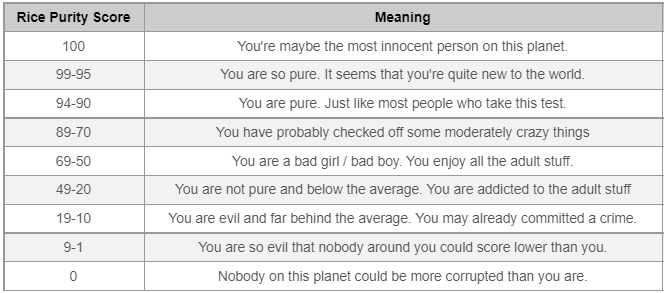Introduction
The Rice Purity Test is a popular survey that measures a person's innocence or experience in various aspects of life. It consists of a series of questions, and after completing the test, participants receive a purity score ranging from 0 to 100. The higher the score, the more innocent the person is perceived to be. In this article, we will explore the meaning behind these scores and what they can signify about an individual.
Understanding the Rice Purity Scores
The scores on the Rice Purity Test are meant to provide an indication of a person's exposure to different experiences. While it is important to note that the test is not scientific or conclusive by any means, it can be a fun way to compare personal experiences with others.
Interpreting Low Scores (0-30)
If you have received a low score on the Rice Purity Test, it means that you have likely been involved in a wide range of experiences and have lived a more adventurous and experimental life. It suggests that you have been exposed to various aspects of relationships, sexual activities, alcohol consumption, drug use, and other social elements. Low scores may indicate a higher level of experience and openness to new things.
Interpreting Moderate Scores (40-70)
If your score falls within the moderate range, it signifies that you have had some exposure to certain experiences but have also maintained a level of innocence in other areas. It shows a balance between experimentation and caution. Moderate scores imply a mix of both conservative and adventurous behaviors, indicating that you have explored some boundaries while also exercising restraint in certain aspects.
Interpreting High Scores (80-100)
A high score on the Rice Purity Test suggests a higher level of innocence and a more reserved lifestyle. It indicates that you have had limited exposure to various experiences such as sexual activities, substance use, and other social activities. High scores are often associated with individuals who have chosen to abstain from certain behaviors or who have had limited opportunities to engage in such experiences. These scores may reflect a more conservative or cautious approach to life.
Factors Influencing Scores
It is important to consider that the Rice Purity Test scores can be influenced by several factors:
- Personal Values: Personal beliefs, values, and cultural backgrounds can play a significant role in shaping a person's behavior and choices, ultimately reflecting in their scores.
- Socioeconomic Factors: Access to opportunities, resources, and exposure to different environments can affect the likelihood of engaging in certain activities. This, in turn, may impact one's score.
- Peer Influence: Friends, social circles, and peer pressure can heavily influence a person's decisions and activities, potentially leading to different test scores.
Implications and Limitations
While the Rice Purity Test can offer insight into someone's experiences, it is crucial to remember that it is not a definitive measure of a person's character or moral values. Scores alone should not be used to judge or label individuals. It is merely a self-reported survey designed for entertainment purposes.
Conclusion
The Rice Purity Test scores serve as a playful way to compare personal experiences and offer a glimpse into a person's adventurousness or innocence. Whether you have a low, moderate, or high score, it is essential to recognize that everyone's journey is unique, and the score should not define who you are as an individual.


No comments yet